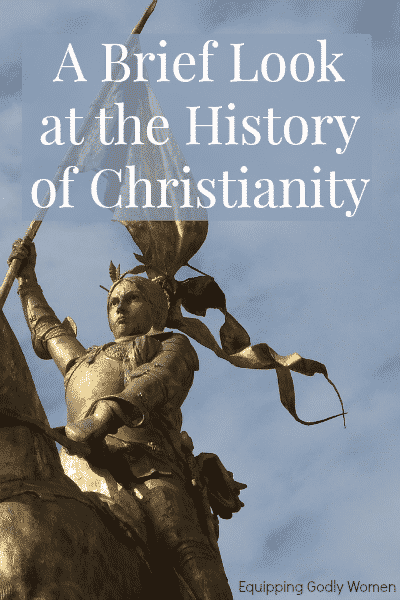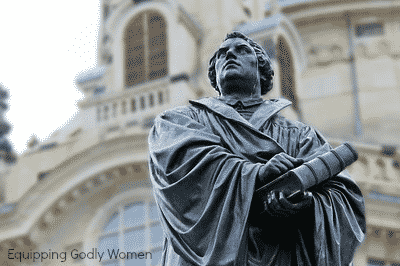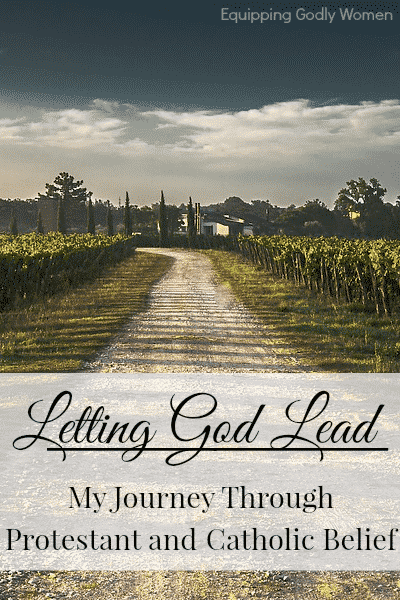A Brief Look at the History of Christianity

This post is post 6 in a series entitled Letting God Lead: My Journey Through Protestant and Catholic Beliefs. While you certainly can read this post by itself, I highly encourage you to check out the rest of the series as well. Find more about this series and a list of all of posts here. *This post contains affiliate links.
To get a full understanding of the whats and hows and whys of the Christian church today, you need to know a little about church history. Not just because it’s important to know, but because so many of the major events that have significantly shaped church doctrine and history throughout the years have been the direct result of other events that happened before them.
Before I begin, I think it is important to say–in no way, shape or form am I even trying to give a complete report. I’m writing a blog post, not a book. Therefore, I am forced to choose only the information I feel is most pertinent while trying to be as unbiased and educated as possible. Feel free to add more in the comments!
The Beginning of Christianity
While the overarching story of Christianity began with the creation of the Universe, the story of Christianity as a religion essentially began with the birth of Jesus Christ around 4 B.C.
Prior to Jesus’s birth, life and ministry, the only way God’s people (the Jews) could have any hope of knowing God and going to Heaven was to keep the Law of Moses. For Jewish people, the law was their life, and they followed their laws like their salvation depended on it (because it did). Non-Jewish people had no hope of Heaven, according to Jewish belief.
Jesus was born a Jew and was raised in Jewish culture. All of the first Christians were as well. For the first few years, all Christians were Jews, but not all Jews were Christians. Instead, many, many Jewish people HATED Christians, because they saw the Christians as blaspheming against God.
At very first, Christians still worshiped at the Jewish temples. After Jesus’s death, resurrection and ascension, however, his followers (who now began to include non-Jewish people as well) began meeting on their own. A separate religion had been born.

The Spread of Christianity
News of Jesus’s death, resurrection and ascension quickly spread through the area and then out to cities farther and farther away as the apostles went out to evangelize. Keeping the message consistent was likely pretty easy in Jerusalem, where there were several witnesses, but as the Good News spread farther and farther away, it became more and more difficult to keep the message consistent. This is why Paul wrote many letters to the churches in far off cities–to correct wrong beliefs that had crept up in his absence.
The first Christians didn’t all believe the exact same things. Some Christians practiced infant baptism while others waited, for example. Still, people seemed to get along well enough for the most part. They were all of the same religion, even if they didn’t exactly agree on all of the specifics.
The Rise of Heretics
It wasn’t long, however, until some people began making claims that weren’t simply “off a little” — they were downright heretical. For example, the Gnostics rejected all things physical and claimed that Jesus was divine but not human. Arius claimed that Jesus was not eternal God, but was the first being God created. Jovinian objected to the idea that Mary was a virgin.
In order to combat these heresies and others, the Church had to take an official stand and formally state their beliefs. These declarations were not new information; they were simply affirming and clarifying what the church had always held to be true so that believers wouldn’t unknowingly succumb to heretical teachings. The Catholic church still does the same thing today.
One such clarification was the Nicene Creed, which was written at the Council of Nicea in 325 and which Catholics still recite at Mass today. It states the basic truths that all Christians believed then and that all Catholics (should) still believe today.
Nicene Creed
I believe in one God,
the Father almighty,
maker of heaven and earth,
of all things visible and invisible.I believe in one Lord Jesus Christ,
the Only Begotten Son of God,
born of the Father before all ages.
God from God, Light from Light,
true God from true God,
begotten, not made, consubstantial with the Father;
through him all things were made.
For us men and for our salvation
he came down from heaven,
and by the Holy Spirit was incarnate of the Virgin Mary,
and became man.
For our sake he was crucified under Pontius Pilate,
he suffered death and was buried,
and rose again on the third day
in accordance with the Scriptures.
He ascended into heaven
and is seated at the right hand of the Father.
He will come again in glory
to judge the living and the dead
and his kingdom will have no end.I believe in the Holy Spirit, the Lord, the giver of life,
who proceeds from the Father and the Son,
who with the Father and the Son is adored and glorified,
who has spoken through the prophets.I believe in one, holy, catholic and apostolic Church.
I confess one Baptism for the forgiveness of sins
and I look forward to the resurrection of the dead
and the life of the world to come. Amen.

Determining a Canon
In addition to the heresies, new writings (such as the Gospel of Thomas) began to circulate that claimed to be inspired that really were not. As a result, church leaders met to decide and make an official statement about which books were in fact inspired. They did not MAKE them inspired–they always were–the church simply made an official declaration.
While opinions varied somewhat on which books should be included, an official list was written up in 367, then approved by the Pope and formally approved by the church in 382. This list contained the Bible pretty much exactly as we have it today, although modern Protestant Bibles do not contain the Apocrypha/Deuterocanonical books–7 books of the Old Testament that are still in dispute today.
The church didn’t decide which books to include willy-nilly of course. With prayer and careful debate, they compared the proposed books against certain criteria, including:
- The books had to be written by an apostle or a close follower of an apostle.
- The books had to be consistent with the rest of Scripture.
- The books had to be consistent with what church Tradition affirmed to be true. (Remember: they didn’t have a Bible yet, so church Tradition was the ultimate measuring stick up until this point.)
- The books had to already have gained widespread use and acceptance.
(On a side note, it is important to keep in mind:
- This was before the printing press, so books had to be transcribed by hand onto scrolls.
- As a result, these scrolls were very expensive, especially if you wanted a complete set.
- As a result of that, not every church had access to all of the books in the Bible.
- Plus, the scrolls were not always written in a language that the people even understood.
- And even if they were, most people couldn’t read. They had to depend on the church to read the word to them and translate it for them.)
- SO… even once people had the Bible, they didn’t really *have* the Bible. They still depended on the church as their source of truth and guidance.
But at last, the church finally had an official list of inspired books of the Bible. Or so they thought.
Fighting, Disagreements and Fractions
Even with an official canon, Christians still had a hard time agreeing on things. Christians had huge disagreements over issues such as when to celebrate Easter, whether or not the Bible should be translated into a language that the people could understand and whether or not the Pope of the Roman Catholic Church has authority over all of the other popes.
There were lots of good things that happened during this time, but there were plenty of bad things that happened too. There was idol worship. Priests were selling indulgences. People were raping and killing in the name of Christianity. Pagan beliefs and practices were intermingling in as more people “converted.” Faith and politics mixed in an ugly way. Most Christians were doing their best, I’m sure, but as a whole, the church was a mess.
And then along came Martin Luther.

Martin Luther and the Protestant Reformation
Today, many Protestants hail Martin Luther as a hero. He stood up to the wrongdoings of the church and set people back on the right path! However, there is a lot about Martin Luther’s life that most people simply don’t know and would be shocked to learn.
Born to very strict, possibly even abusive parents, Martin Luther lived in great fear of God’s punishment. He saw himself as worthless and completely incapable of pleasing God, though he did everything he could to gain God’s approval, including becoming a monk and a Bible teacher. But he never felt like enough, and this was very burdensome to him.
While teaching the Bible, Luther came across verses that said that man was saved by faith, and suddenly a huge weight was lifted off of his shoulders. He didn’t have to WORK for his salvation–God would DECLARE him righteous when he responded in faith! What a relief! (And it should be noted–this is exactly what the Catholic church had been teaching all along.) Except Luther took it one step farther and said that works were not necessary at all–just faith ALONE–a belief that is now widely held, but that isn’t actually Scriptural at all.
As a monk, Martin Luther saw firsthand how corrupt the Roman Catholic Church had become. Priests were selling indulgences. People didn’t take the body and the blood seriously. This upset Luther greatly (as it should), and he set out to do something about it.
I don’t believe Luther set out to start a new religion when he nailed his 95 Theses to the church door. I believe he was just calling for some much-needed church reform. But what he got was a lot more than he bargained for.
- The church split from one large and diverse body to tens of thousands of small denominations. (To be fair, this wasn’t the first split, but it was the largest.)
- Without the church as the authority, people could read the Bible for themselves. Now, people can claim the Bible says whatever they want it to say.
- With faith ALONE being necessary for salvation, people didn’t have to work out their salvation with fear and trembling anymore. Instead, they could do whatever they wanted to and skip the sacraments altogether.
- By throwing out the Apocrypha/Deuterocanonical books, Luther also effectively got rid of several major tenants of Catholicism.
Of course, you don’t have to believe all of these things to be Protestant. As a Protestant, you can believe whatever you want. You’re the boss! 😉
Here are a few other interesting facts you probably didn’t know about Martin Luther:
- Martin Luther believed in the real presence of Jesus in the Eucharist.
- He didn’t just want to remove the Apocrypha/Deuterocanonical books–he wanted to remove James, Hebrew, Jude and Revelations as well.
- The Apocrypha/Deuterocanonical books were included in the first version of the King James bible and were included in an appendix until 1827.
- Luther believed that Jesus committed adultery with the woman at the well and with Mary Magdalen.
- He HATED Jews. So much that Hitler considered him an asset.
Just some informative food for thought 🙂
So, Are the Apocryphal Books Inspired?
As I set out to research this post, this was the question I most wanted to answer. Unfortunately, despite reading tons and tons of great (and not so great) information on the subject, I still find the results very inconclusive.
The problem isn’t a lack of a strong argument (both sides make some good points), but that the information in the articles I read was so directly opposed to the information in the other articles that I read that it was very difficult to know who to trust. And since I live today and not 1,700 years ago, I can’t exactly go back and fact check. Frustrating.
Sooo… the best I can do is offer up a summary of some of the arguments I’ve read, and you’ll just have to decide for yourself.
**Many of these are arguments/counter-arguments. Read the side with the **s first if the line has them.
| Arguments for the Apocrypha | Arguments Against the Apocrypha |
| **Jesus and his disciples all quoted from the Septuagint, which contained the Apocrypha. | Just because the extra books circulated with the inspired books doesn’t mean Jesus and the disciples saw them as all inspired. |
| Jesus and disciples do reference the Apocrypha, and anyways, even if they didn’t, there are other OT books that also aren’t referenced, so it’s not a requirement. | **Jesus and disciples do not reference the Apocrypha. |
| The books were found with the Dead Sea Scrolls. | The books were not found with the Dead Sea Scrolls. |
| 1. The Jews didn’t accept the extra books—but they didn’t accept the New Testament either. 2. Their opinion doesn’t matter because they aren’t Christian. 3. Jesus transferred authority to church. 4. Some Jews do accept them. | **The Jews didn’t accept the Apocrypha, and they had the authority to declare the Old Testament canon. |
| 1. The Jews didn’t declare an official, closed canon. 2. The Council of Jamnia may have never happened. 3. The Jews there were VERY anti-Christian. | **The Jews declared the OT canon at the Council of Jamnia in AD 90 or between 200 to 300 BC, depending on the source. |
| The early church fathers all supported the Catholic Canon. | The early church fathers did not support the Catholic canon. |
| Just because they questioned the books doesn’t mean they weren’t inspired. The fathers were being careful. | **The early church fathers questioned the Catholic canon. |
| The books had always been listed as part of the Catholic canon. The Catholics weren’t adding, simply reaffirming. Protestants took them out. | **The Catholic church added the books in the 16th century at the Council of Trent. |
| When reading the Apocrypha, you have to read for the intended purpose. The writers were seeking to tell stories, not write history books. | **The Apocryphal books are full of errors. |
| Paul claims portions of his letters are uninspired. God can work through people without them knowing it. | **The books themselves claim to be uninspired. |
| The books are Scriptural, so therefore, so are the concepts. They don’t have to be listed in multiple places to be true. | **The books contain unscriptural concepts, such as praying to saints and purgatory. |
| No response. | In Matthew 23:35, Jesus mentions “from Abel to Zechariah” — the first and last martyrs in the Jewish OT canon, this shows Jesus did not consider the Apocrypha to be Scripture. |
| Luther threw out the extra books to support his misguided views. | The Catholic Church includes the books to support their misguided views. |
| **The number “73” is associated with holiness and perfection, while “66” is only one number away from the Devil’s number. | That’s just a coincidence, and reaching quite a bit. |
Hopefully you can see what the problem was! Not a lack of information, but apparently a lack of trustworthy information.
Why Does it Matter?
As we’ll see over the next couple of weeks, many major Catholic doctrines, including Purgatory and praying to Saints, are based either entirely or in part on verses found in the Apocrypha/Deuterocanonical books. Without these books, the doctrines have no Scriptural basis. Not that the church Needs Scripture, but still, it’s a great defense.
I’m sorry to report I have yet to be able to come up with a conclusion. What about you? As always, leave me a comment (or a book!) so we can sort through the questions and the issues!

Enjoyed this post? Don’t miss the rest of the posts in the series!
The Day I Realized My Religion Got it Wrong
10 Common Catholic Church Myths that Critics Believe
Is the Eucharist Really Just a Symbol?
Who has the Ultimate Authority? A Biblical Look at Sola Scriptura
A Brief Look at the History of Christianity
What All Christians Should Know About Priests, the Pope and Confession
What Do Catholics Really Believe About Mary, Saints and Statues?
Infant Baptism or Believer’s Baptism? Which is Correct?
What is Purgatory? What are Indulgences?
Why Do Catholics….? Honest Answers to Your Burning Questions
Protestant and Catholic Beliefs Series Conclusion
Resources and Further Reading
I’m not asking you to believe because I say so. Please DON’T take my word for it! The purpose of this series is only to share what I’ve learned on my journey in order to inspire you to begin a journey of your own. Here are a few helpful resources to get you started.
*This post contains affiliate links, which means if you make a purchase, I may make a small commission at no additional cost to you. Thank you!
Catechism of the Catholic Church
Christian History Made Easy by Timothy Paul Jones, PhD (This is a REALLY good book. Very informative, easy to read, and generally unbiased.)
The Catholic Church: What Everyone Needs to Know by John L. Allen
A Concise History of the Catholic Church by Thomas Bokenkotter
Surprised by Truth: 11 Converts Give Biblical and Historical Reasons for Becoming Catholic by Patrick Madrid
http://www.bible.ca/catholic-apocrypha.htm
http://www.bible-researcher.com/
http://catholicdefense.blogspot.com/2011/07/can-protestants-rely-upon-council-of.html
http://catholicdefense.blogspot.com/2009/10/protestantism-and-early-church-fathers.html
http://www.fisheaters.com/septuagint.html
http://www.gotquestions.org/canonicity-scriptural.html
http://jimmyakin.com/deuterocanonical-references-in-the-new-testament
http://www.justforcatholics.org/a63.htm
http://www.ncregister.com/blog/mark-shea/a-reader-puzzles-about-the-deuterocanon







When I saw the title I didn’t think the topic.could be covered adequately in a blog format, but i was wrong. You did a great job of making the.history concise while pointing out important details. Great Read.
Thanks, Tesha! That’s why I had to add a disclaimer at the beginning–there is NO way to cover EVERYTHING, but hopefully I hit the most important points for a concise little overview.
This is incredible! What a wealth of information!
Thanks, Sarah Ann!
This is fantastic! What great resources! I am going to bookmark this so I have it as a reference. 🙂
Thanks, Laura!
Thank you for this in-depth lesson. I love history and found this post interesting and informative.
Thanks, Keianna! If you enjoyed this post, you should check out the rest of the series as well. FULL of TONS of great information. You can find the list of links here: https://equippinggodlywomen.com/my-journey.
As a Catholic who often has to explain our side of why we have the “extra” books of the Bible, I explain it like this. From what I’ve always learned, the Jews and Christian/Catholics were putting the Bible together roughly around the same time (give or take some years). When it came to the Tanakh (The Jewish name for their bible) and our Old Testament, the difference in what we included came down to the languages in which the scrolls were written. The seven deuterocanonical books, although both Jews and Christians considered them important/inspired, etc. were only written in Greek (I believe it’s Greek). However, Jewish people only wanted to include scrolls in the Tanakh that could be found written in Hebrew. Jewish people still considered the seven books important and continue to reference them today. The perfect example is the celebration of Hanukkah. This story can only be found in the book of Maccabees which is one of the deuterocanonical books and only in the Catholic translations of the Bible, not in the Jewish Tanakh. I always found it funny that a holiday (although minor for Jewish people) isn’t in their main scriptures. Hope that helps in the discussion. 🙂
Yes, I read that argument too. The problem isn’t that there isn’t a good argument–it’s that there are too many conflicting ones and both sides are giving an oversimplified answer! 🙂 It’s a lot to sort through.
Very enlightening indeed.Thank very much for sharing with us “unenlightened ones” your extensive and unselfish efforts of your research…GOD Bless
Hey, I was far LESS enlightened than the average person only a couple months ago! Everything I know is only from all of the hours of studying I’ve been doing lately. And I hope this series inspires others to do the same 🙂
Ha! Thanks be to God that we have some Roman Catholics in the conversation! I somemites joke that part of my work seems to be to convince people on my (Protestant) side of the aisle that there are a lot of you who really do love Jesus– extra books and all!